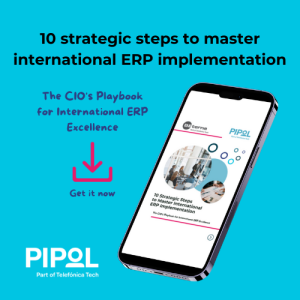10 tips for successful ERP across borders

Markets and companies have become increasingly global over the years which has led to international companies using different, decentralized ERP systems. Some of the downsides reckoned by companies are difficulties in consolidating financial data as well as sharing data about customers, vendors, items, prices, and more. The rapid pace of technological and economic development has made it possible for companies to achieve increased central control of international corporate finances. That puts them in a better position to compete globally.
Many companies are opting for a single business management system (ERP system) to resolve unused synergies of intercompany integration and to achieve a better control of collaboration within and outside the organization.
It is, however, a task which is easier to decide than to execute. Therefore, we give you 10 tips for successful International ERP implementation across borders. Tips that we have gathered in the past 20 years doing international ERP implementations. Tips that have helped other executives successfully implement ERP across borders:
- Establish an improvement culture: The shorter phases a project can be divided into, the greater is the chance of success. Prioritize what is most important first, and always have a future phase planned, where you can park unresolved tasks or change requests. This way you will be able to maintain a direction without losing momentum.
- First you understand, then you simplify: If you automate a process which is complex, or that you do not fully understand, you will get a complex system that you don’t understand. That is why you should follow this flow: Create understanding, simplify, automate. You cannot build systems before your processes are optimized. In other words, start in due time.
- Think quality and ownership together: Quality assurance outside a process is an overhead. Quality assurance incorporated in a process is proactivity. Processes that have built-in quality assurance provide the best basis for innovation and consistency in implementation.
- Do not underestimate local culture and conditions: Whenever you assume something about ERP systems across borders, assume you’re wrong. The surprises are always hidden in the details, not in the main processes. Never underestimate local complexity and make sure to involve local stakeholders.
- Clean up processes: The implementation of a new system is hard work against habitual thinking and old action patterns. Some deviations are necessary, others are simply a reminiscence from previous workflows. Clean up the processes and requirements. If they are not formalized, then eliminate them. It is a much bigger task to implement and embed a global process, than it is to define it.
- Make sure that the perspective is anchored: Most users automatically think functionality when evaluating which system to choose. They are thinking: How can I make my current work in the new system? It can result in the optimization of parts of processes, but more often there is greater value in an evaluation against a future state scenario.
- Consider change management: There will always be changes. Therefore, think of change as something good, as something that creates new possibilities, translate the need for change to a language which the various stakeholders understand, and you will gain greater organizational support for the change.
- International implementations have greater potential: Increased structure and fixed processes are not necessarily the right model for all. A company can run on principles and values alone without a single formalized process. But when it comes to international ERP implementations, structure is necessary to guarantee a bottom-line lift. And because many processes are repeatable from one country to another, you can achieve great synergies by having an appropriate structure that can be reused widely within the organization.
- Surprises lie in the details: In practice, the plan never fits 100%. There will always be ongoing fine-tuning of the project caused by internal or external changes. Plans are only worth something if they can be adapted to the changed conditions for success. And changes within a project may be something you continuously are searching for in order to identify and realize new potentials and synergies, but make sure there is a formalized process for managing change requests, so you ensure a realistic process and functional definition of the project.
- Collaboration and communication are needed: You cannot just enter a fixed-price contract with a supplier and transfer all responsibility to them. An agreement alone cannot guard the company against mistakes – such agreements can, in some cases, turn out to have the opposite effect. A good and professional communication is far more productive for the project.
Read in more detail on how to take the complexity out of the localization process and make the right choices for your international organization in our blog Taking you organization across borders.
Contact us here if you would like to discuss your specific situation and considerations on how to implement an ERP solution across borders.
Pipol has 20+ years of experience within international ERP implementations. We are present in +85 countries through our network of local partners. With Pipol, you get one global solution, one global delivery framework, one global contract, one global team and – very importantly – one single point of responsibility for the entire delivery wherever in the world you operate.





